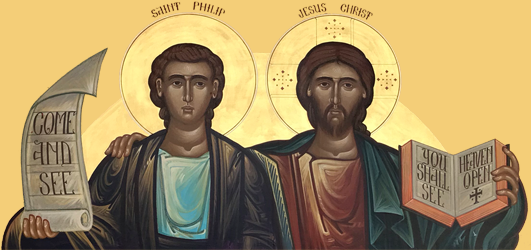“Then the Lord said to Moses, ‘Make a serpent for yourself and put it on a signal pole; and it shall be, if a serpent should bite someone, when the one bitten looks at it, he shall live.’” (OSB)
Israel’s faithlessness at Kadesh-Barnea was made only more grievous by their rebellious “repentance”: Having forfeited the birthright of the Land, and having by divine decree been consigned to die in the wilderness (Num 14:26-37), they rebel even further and seek to go up and take the Land without God among them (Num 14:42). Wherefore many in Israel “fall by the sword” (Num 14:43).
Subsequently, there is another challenge to the divinely ordained leadership of God’s people (the rebellions of Korah, Dathan & Abiram, Num 16), with the rebels being swallowed whole into hades. But this effects no meaningful change in the people, for on the very next day Israel is back to grumbling, and Moses and Aaron must appease God through a propitiatory use of incense to put an end to a plague consuming the people (Num 17:6-15).
In Numbers 20, the people are again grumbling at Kadesh, as they are approaching Edom on their way to the Promised Land (cf. Num 20:14-21). And it is here that Moses (faithlessly) twice strikes the spiritual Rock “that followed them” in the wilderness, “and that Rock was Christ” (1 Cor 10:4). Right after this, Aaron dies (Num 20:22-29), but it is not until we get to Numbers 33:38 that the narrator tells us that Aaron’s death occurred on the 40th year after leaving Egypt. This means that Numbers 15-19 comprise 38 years of implied narrative time, and that starting with Numbers 20, we are dealing with the second generation of Israelites, those who were 19 years old and under at the rebellion at Kadesh-Barnea (Num 14:29). Clearly, those who were inexperienced “children” in Numbers 14, who did not yet “know good nor evil” (Num 14:23), have somehow “picked up” the bad habits and evil dispositions of their fathers!
The second generation grumbles against God and Moses just like the first generation, so God must judge them in like fashion—this time, not through a plague, but with serpents. Moses again intercedes, and God provides a remedy to the serpents’ poison in the copper serpent on a “signal pole” (Num 21:4-9).
Reflecting on Christ’s own interpretation of this story in John 3:14 as fulfilled in the Cross, St. Cyril of Alexandria comments:
This story is a type of the whole mystery of the incarnation. For the serpent signifies bitter and deadly sin, which was devouring the whole human race on the earth … biting the Soul of man and infusing it with the venom of wickedness. And there is no way that we could have escaped being conquered by it, except by the relief that comes only from heaven. The Word of God then was made in the likeness of sinful flesh, “that he might condemn sin in the flesh” (Rom 8:3), as it is written. In this way, he becomes the Giver of unending salvation to those who comprehend the divine doctrines and gaze on him with steadfast faith. But the serpent, being fixed upon a lofty base, signifies that Christ was clearly manifested by his passion on the cross, so that none could fail to see him (Comm. Jn. 2.1 [ACC, p. 123])

